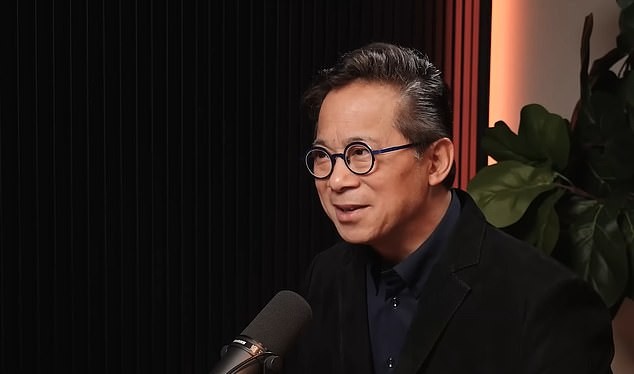Harvard-trained cancer expert reveals the moment his mother's stage 4 cancer vanished after three immunotherapy sessions at age 80
A world-renowned Harvard-trained doctor has revealed the astonishing moment his 80-year-old mother's terminal cancer vanished after just three rounds of cutting-edge treatment. Dr William Li, a US-based physician-scientist, bestselling author and founder of the Angiogenesis Foundation, shared the extraordinary account on the Mighty Pursuit podcast, where he described witnessing cancer 'cured' in patients who were once 'out of options'. The clip, which has now been viewed more than half a million times, has given people around the world fresh hope at beating cancer - especially non-genetic variants - once and for all. 'I have seen how cancer can be cured,' he told the hosts. 'I've had well over a dozen patients who went from stage four to stage zero.'

In This Article:
The turning point: a mother's stage 4 cancer and a controversial prognosis
One of those patients was his own mother, who received a devastating diagnosis of stage four endometrial cancer at age 80, which had already spread throughout her body. To make matters worse, her oncologist warned that traditional treatment would likely strip away what little quality of life she had left. 'The oncologist told me the treatment would be worse than the disease, so why don't I take her on a cruise while she's still feeling well and enjoy some time with [her],' he recalled. A world-renowned Harvard-trained doctor has revealed the astonishing moment his 80-year-old mother's terminal cancer vanished after just three rounds of cutting-edge immunotherapy treatment But Dr Li instead turned to a new frontier in cancer medicine - immunotherapy paired with a diet designed to lower inflammation.

Immunotherapy and Gut Health: A New Frontier in Cancer Medicine
But Dr Li instead turned to a new frontier in cancer medicine - immunotherapy paired with a diet designed to lower inflammation. This rapidly growing area of cancer treatment is designed to boost the body's own immune system to recognize and fight cancer cells. According to Cancer Australia, these therapies work by helping the immune system attack tumours and slowing their growth and spread. The treatment can be given in hospitals, clinics or doctors' offices, often in cycles with periods of rest in between. Determined to give his mother a fighting chance, Dr Li secured access to a brand new immunotherapy at the time, which he explained is designed to 'jack up your own immune system'. Alongside the therapy, he focused on strengthening her body as a whole by optimizing her gut microbiome, giving her medicine and special foods to lower her inflammation. Her mother received just three infusions, each lasting 20 minutes and spaced three weeks apart, and he says the turnaround was nothing short of remarkable. 'We scanned her at the very beginning, cancer [was] everywhere, liver, lungs, you name it. At the end of week three we rescanned her - zero. And that was a decade ago.'

What immunotherapy actually does
Cancer Australia explains that immunotherapy works by using a person's own immune system to detect and destroy cancer cells, particularly those that use 'checkpoint' proteins to hide from the body's defenses. Antibodies can flag cancer cells for destruction, slow their growth or even deliver targeted treatments directly to tumour sites. Other forms of immunotherapy include cytokine-based therapies and cancer vaccines, which stimulate the immune system to fight existing cancer or prevent certain cancers from developing. Like any medical treatment, immunotherapy can come with side effects such as fatigue, fevers, nausea, inflammation or injection-site reactions, but many patients tolerate it well. Researchers at the Garvan Institute, however, have found that some checkpoint inhibitor immunotherapy can make some cancer patients more prone to common infections. According to Cancer Australia, immunotherapy helps the body's own immune system recognise and attack cancer cells, slowing tumor growth and spread. Treatments are offered in hospitals or clinics, typically in cycles with rest periods in between

From killing tumors to healing the person
Dr Li believes the future of cancer medicine is shifting from simply attacking tumours to strengthening the patient's entire system. 'A lot of people don't know this, but only five to ten per cent of cancers are due to genetics, the rest is due to environment, diet and lifestyle,' he said in the clip. 'When I started out, we just viewed cancer as a problem in an organ with a mutation, where the cells go wild and pretty much you have to destroy the tumour, (the cancer) if you want to treat it, [and] hopefully it's successful.' 'It might work for a little while, but usually the cancer will come back and kill you. We're moving away from killing the cancer to healing the person.'

A message of hope amid rising diagnoses
In groundbreaking research published in February 2025, Australian scientists at Wesley Research Institute also identified a key reason why some head and neck cancer patients don't respond to immunotherapy, which is a discovery that could revolutionise treatment. The study found that dense layers of macrophages, a type of immune cell, can form a barrier around tumours, stopping immune cells from attacking cancerous tissue successfully. With nearly one million new cases diagnosed worldwide each year and survival rates still stubbornly low, experts say this finding could pave the way for personalised therapies and better outcomes for thousands battling this aggressive disease. Dr Li's story comes as cancer rates among younger adults are climbing, but his personal case studies, combined with this new research, are offering fresh hope to millions and highlights what he believes is the next era in cancer treatment. Mighty Pursuit noted that diagnoses among people aged 18 to 49 have sharply increased over the last two decades, leading many to seek answers beyond traditional medicine.

Li's voice and legacy in cancer research
Dr Li has become a prominent voice in the field, best known for his viral TED Talk, 'Can We Eat to Starve Cancer?', which has amassed more than 11 million views. His research has contributed to the development of more than 40 medical treatments and two New York Times bestsellers exploring the link between food, health and disease prevention.

